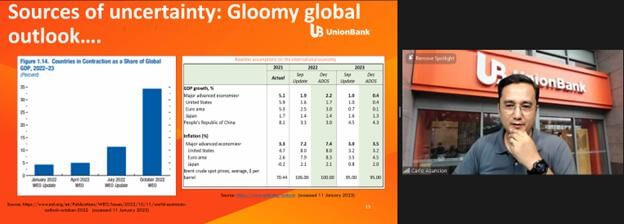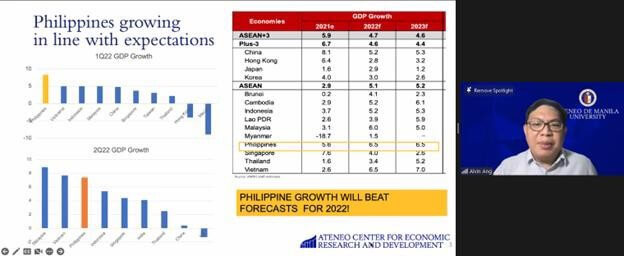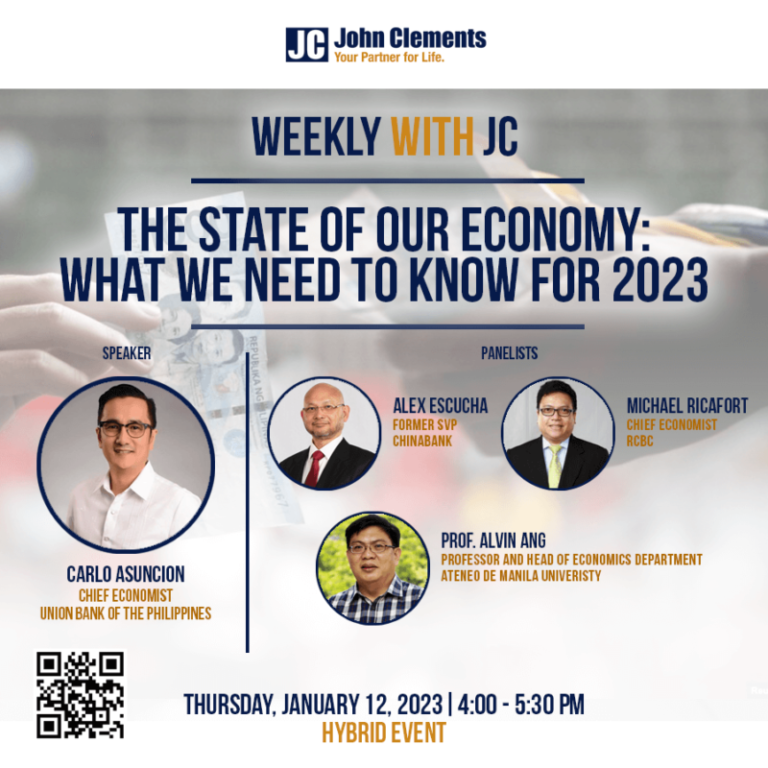Whether you’re working at the office, on the road, or from home, it’s best to know where the Philippine economy stands in 2023. Our first Weekly With JC (WWJC) event of the year was about the state of our economy, how 2022 affected it, what attitudes work best in dealing with it, and what could come next. To get the clearest, most concise, and actionable model of 2023’s Philippine economy, we had the privilege of inviting a quartet of superb speakers and panelists to join us at our Ayala Avenue headquarters for an informative and illuminating afternoon.
Union Bank of the Philippines’ veteran economist Carlo Asuncion was our featured guest speaker. The title of his opener, “The State of the PH Economy 2023: Navigating the Era of Uncertainty”, acted as both a primer and summation for the financial system insights the audience witnessed. While acknowledging that the mood of the Philippines appears to have improved and stabilized, he produced data from the 2021-2022 Human Development Report that illustrated a widespread sense of sober optimism coupled with creeping uncertainty. Yes, the third quarter (3Q22) of the 2022 Philippine economy performed better than expected, thanks to consumption. By all accounts, there’s an uptrend in the Philippines’ economic activities, even more so than the likes of Vietnam and Singapore. Although, Mr. Asuncion stressed that how one views these milestones must be tempered with the knowledge that beyond the archipelago, inflation is rising and GDP growth is slowing, and the consequences of these trends will soon have an impact on the Philippines. The uptick in underemployment, and part-time job generation, is likewise not an indicator of job quality or long-term sustainability as it would be if this increase in employment involved full-time jobs.

The state of the Philippine economy, as Carlo Asuncion posits, is favorable yet fragile. The debt of the Philippines is anticipated to decline in 2023 due to continued economic growth, and how 70% of that is domestically generated. Robust increases in domestic consumption are expected due to support from Overseas Filipino Worker (OFW) remittance inflows. The current administration’s 2-23 budget hopes to provide ample fiscal policy aid from the first budget of the term onward. Nonetheless, the specter of geo-political tensions as seen in China and Taiwan, as well as in Eastern Europe, looms large alongside global recession risks that could stymy this progress.
Michael Ricafort, the Chief Economist for RCBC, responsible for research and strategy regarding global and local economies, sprung from the foundation set by Mr. Asuncion to talk more about future behaviors in transportation and academics. Based on worldwide trends in infrastructure development and buying habits, Mr. Ricafort speculates that electric vehicles will start to become more viable and widely available in the Philippines. Renewable power projects and other Environmental, Social, and Governance (ESG) initiatives in the Philippines look to be promising in how they’re progressing. The workforce of tomorrow, current students in higher education, have been pursuing STEM-related (Science, Technology, Engineering, and Mathematics) proficiencies, potentially providing the Filipino economy beyond 2023 with a boom of skilled and knowledgeable experts on its own shores.
Dr. Alvin P. Ang of the Ateneo de Manila University, and a senior fellow of the school’s macroeconomic research and forecasting unit, Eagle Watch, then brought out his “Moving Ahead in a Rough Road” presentation. It began with a series of graphs that showed that as of late 2022, the Philippine economy had managed to rerail itself to the growth forecasts speculated in 2019. Over the course of the pandemic, much of the disposable income of the country’s citizens had been cautiously stored, increasing savings nationwide for a time until the lockdowns subsided.

Though travel had been restricted over this period, jobs were still being generated, but mostly in the household and electronic repair departments, rather than an overall rise in vocations borne from the competitive advantage of the Philippines improving. In fact, Dr. Ang found out that the most productive sectors of the Philippine economy like Manufacturing, IT, and BPOs are the ones that employ the least number of people. He did have good news for real estate affiliates, as the housing market of the country holds promise. However, he concluded his segment by reminding the audience that international factors, such as the reopening of China, potentially increasing the global price of oil, and the ongoing conflict between Russia and Ukraine can still drastically alter the direction of the Philippine economy in 2023.
Alex Escucha, former Senior Vice President at China Banking Corporation, the 2005 President of the Philippine Economic Society, and current chairman of the UP Visayas Foundation. Inc, took a moment to appreciate how his freedom from a formal banking system allowed him to speak both candidly and objectively on the subject of the Philippine economy in 2023. He spoke of the push-and-pull of sugar imports, and the self-interest of certain political sectors that simultaneously bloated and stymied Philippine economic growth. Based on his attendance at two World Bank Development Report events, he presented a shocking statistic: for every 1% increase in the Philippines’ inflation rate, around 300,000 people fall below the poverty line. As the evening winded down, Chairman Escucha took his audience into the domain of nutrition, citing that poor nutrition at a child’s early age could stunt their learning ability, potentially cutting them off from fruitful career pursuits.

These accounts constitute just a fraction of the facts and figures these four professionals presented on January 12, 2023. For even more sharply defined inferences and studies, click here for a free video stream of the entire event.
John Clements will be hosting another Weekly with JC event “Banking: What will Fuel Growth in 2023?” this January 26, 2023, which you can register for in-person or virtual attendance here.
If you’d like to act on the counsel of Mr. Carlo Asuncion and Dr. Alvin Ang, and give the full-time employment section of the Philippine economy a boost, John Clements’ Client Solutions for Executive and Professional Staffing resources.





